PRESERVING A MILITARY LEGACY FOR FUTURE GENERATIONS
The following Reflections represents ETCM Gene Treants’s legacy of his military service from 1966 to 1996. If you are a Veteran, consider preserving a record of your own military service, including your memories and photographs, on Togetherweserved.com (TWS), the leading archive of living military history. The following Service Reflections is an easy-to-complete self-interview, located on your TWS Military Service Page, which enables you to remember key people and events from your military service and the impact they made on your life. Start recording your own Military Memories HERE.
Please describe who or what influenced your decision to join the Navy.

It was the summer of 1966, and I was between my Sophomore and Junior years at College. I knew I might be in trouble with my deferment since I majored in beer and girls with a minor in partying. One of my best friends had decided to go into the Navy but had not yet joined. He worked on a survey crew, and I worked construction with my dad’s company. I was doing everything from electrical work, plumbing, carpentry, swimming pools, and you name it, but the work was never-ending. The days began at about 0700 on the job site and ended at too damn late.
One particularly hot and miserable day, after I had worked in an attic, removing insulation from a fire area, I had just about had it. My dad had left about noon for some meeting and left me in charge, and we had lots of work to finish. We finally completed the job at 6:30 pm, cleaned up, and left. When I got home, my dad was pissed it had taken so long and told me that I was not doing a good enough job. I told him if he spent time on the job instead of going off and doing other things, maybe we could have finished on time. Of course, he was not happy with my answer and told me that I was not working hard enough. I said that was fine and that I was done. I quit. The next day he asked me why I was not dressed, and I said I had quit since I was not a good enough worker. He left in a huff, and that was all it took.
I called my friend and said I had quit, and he said he had too – about a week before. We met for breakfast and then went to the Navy Recruiter and joined up on the Buddy Plan. It was July 15, 1966, and we were in the Delayed Entry Program. My parents were upset but could not stop me like they did when I was 17 and had wanted to join the Army after graduation from High School. Dad asked me to return to work and even said he was sorry he had said what he had. I returned to work and ran one of the crews until I left for Bootcamp in November.
Whether you were in the service for several years or as a career, please describe the direction or path you took. What was your reason for leaving?

I had initially joined the Navy in the Nuclear Power Program (a 6-year Obligation). After Recruit training and leave, I went to ET”A” School at Great Lakes. This included Basic Electricity and Electronics in a leftover building from WWII that was so hot in the winter that we had to have windows open even with snow on the ground. It was so hot in our classrooms we often stood in the back of the class or sat on the window sills to stay awake. Sitting on the window sills did have on danger. If you fell asleep, you might fall out and land on the ground outside, sometimes from the second story. We also lived in barracks that were remnants of WWII. Old, creeky, and cockroaches had been in the buildings since that war.
Upon graduation from ET School, I was one of the ones who had to go to Sea for at least a year while awaiting space for Nuc Power School at Banbridge, MD. I went to USS Cambria (APA-36), a Fast Attack Troop Transport. Our job was to take Marines to any trouble spot in the world, along with their combat gear, including jeeps, tanks, etc.) and get them there fast (at 8 to 10 knots top speed). On Cambria, I was assigned as Boat Radio Tech and maintained the transceivers used to communicate between the boats and our ship and the beach. After I reported, we received new gear to replace our ancient equipment, so I also had to install new antennas on our masts. As soon as I finished this assignment, my Leading Petty Officer (LPO) found out I used to be a plumber and assigned me to maintain the Air Search Radar, AN/SPS-40 Serial number 3. I spent more time working on the cooling systems than anything else on that radar. The best part of being on this ship was getting to deploy to other places. We made cruises to GITMO, the Caribbean, and even the Mediterrane for a 6-month cruise. I was finally a fleet Sailor on a ship that had earned the Battle “E” for Communications and Electronics. After my year in Cambria, I was transferred to Nuc power school.
Nuc Power School was a real disappointment. We were all tested to see how smart we were and what we needed to do to get up to speed upon arrival. I was in one of the two highest-performing groups. As such, we would only have to do 40 hours of MANDATORY night study a week. Yes, you read that right. The smart kids like me only had to put in an additional week of work every week in addition to our 40-plus hours of daily classes? No Liberty at all for the first month. Physical exams and other tests were also run, and we had lots of things to do in addition to DUTY, On top of studying. At the end of my first month, I was called into medical. I had been given an exemption for my vision since I had 20/200 vision uncorrected. It seems that the policy had changed, and I no longer had a deferment. Oh NO! Goodbye School, and I was transferred to Groton for Submarine School. My vision was still good enough for subs, but not for nuclear subs? Wait a minute? I had just run into NAVY policy. LOL
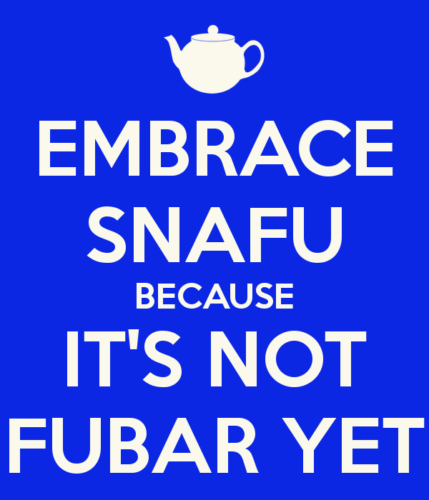
At New London/Groton, there were no current openings for Sub School, so I had to wait, AGAIN. I was assigned to Engineering and Repair Department and was put in charge of Hull Penetrations in the Periscope and Antenna Shop. Yes, ET3 was doing the work of making holes in subs and patching them. Eventually, the Vision deferment SNAFU was figured out, and I was transferred again. On my Dream Sheet I had put in for Germany, there is a Communications Detachment there. Orders came in, and I was so close I was sent to Guam, not Germany, but they both started with a “G,” so I could not complain.
Guam, “Where America’s Day Begins.” At least, that is the motto of the island nation: hot, humid, and a stopover for many troops on the way to Vietnam. I had at least been sent via Great Lakes and had a chance to go to “C” School on gear that would rule my career for a few years to come. High Power High-Frequency Transmitters. I was even in School long enough to drive up to Milwaukee and spend the day watching the first moon landing. But I digress. Upon arrival in Guam, I was sent to the transmitter site/Golf Course. I was there for 19 of the longest months (felt longer) of my life. What could you do in Guam? There was the club for drinking, movies, drinking, swimming, drinking, driving around the island – 18 miles long and 8 miles wide, drinking, working, drinking. I see a pattern here, do you? Finally, I got to go on R&R to Hong Kong, the first of a few trips there, and each was well worth it. Nineteen months later and a pay grade higher, I left Guam AT LAST.
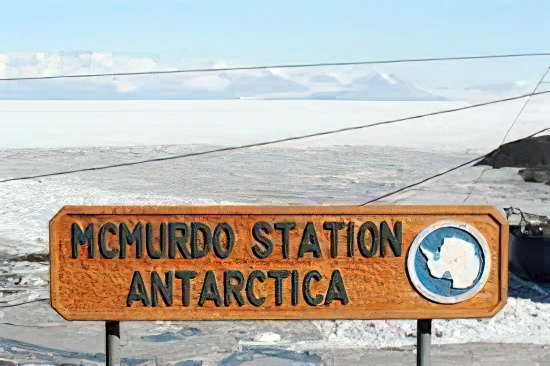
Hello Great Lakes! Since I had left Sea Duty in Guam and had to go back to Sea Duty, Great Lakes for “B” School (Advanced Electronics) was considered Sea Duty. This was a very good sea duty, and I enjoyed the time there. The biggest problem was that the Navy was cutting back on personnel and promotions, and I discovered a new thing no Electronics Tech had ever heard of before Passed, Not Advanced (PNA) on the Fleet Wide Exams. Yes, it was my very first time eligible, but still, no one in School, staff, or students knew what it was. Not one student was advanced that year. So it was time for transfer again. I talked to my detailer, and since I was the honor grad, I got to pick my duty station. It had to be sea duty, and it had to be for at least a year and fit my High Power Transmitter Code.
Hello Antarctica! Well, actually, Sea Bee Center, Davisville, RI. I was assigned to Naval Support Force Antarctica, and I was there as both an Instructor and Maintenance Technician! In Davisville, I took four fledgling Techs under instruction to teach them all about the transmitters they would be maintaining on the Ice. Of course, that had necessitated my going thru Instructor Training in Davisville. After Arriving in Antarctica, I took them all up to the transmitter site and made the needed repairs there, then spent time making sure they had a thorough grasp of the gear. Transmitter Siter McMurdo was self-contained and included living quarters, a cooking area, and even a toilet that burned human waste. After making sure they were all okay and able to maintain the place, I joined the Electronics Field Team, and we began our rounds of the Continent. We went to and installed new or repaired equipment at many places, including the South Pole, Byrd, Hallett, Siple, and a few more.
Upon leaving Antarctic Support, it was Benvenuto Napoli. Since I had completed Sea Duty at Guam, Great Lakes, and Antarctica, it was time for Shore Duty! Yes! Many, many Sailors have a low opinion of Naples. My last visit before shore duty was on Cambria, and we were only there for a week. Since I was not looking for bars and clubs only, I had had a good time in Naples then, and now I was looking forward to getting there. I was stationed at Licola, the NATO Transmitter Site, a joint NATO and US Navy Site. When I first arrived, the place included a BEQ, Galley, Club, and many amenities, making it an excellent place to live and work. I had shipped my car, and it arrived a few weeks after I did. Within two months of my arrival, NATO shut down their side and support, so I had to find a place in the local economy or live in the barracks in Naples, a 30 min drive away – NO WAY! I found a nice place with two bedrooms 600 feet on the Bay of Naples overlooking Capri and Ischia. Licola A Mare was a resort in the SUMMER, but year-round there were about 600 residents, 300 Italians and 300 Americans. Fun place to live, and while in Naples, I was promoted to ET1.
Then it was on to Charleston and Mine Sweepers. I was getting close to my EAOS and had asked to stay in Naples for discharge so I could wander around Europe for a bit, but NO, my detailer wanted me to return to the states. I was sent to Mine Division 125 as the Electronics Material Officer (EMO). I was responsible for an ET Shop with four techs, and we maintained radar (pathfinder), Sonar (fish finders), Communications gear on 8 Mine Sweeping Boats, and an LCU. I also trained Reserves on their weekends and when it was time for their annual training. I also looked for jobs on the outside and came close to getting out because I received some good offers. However, when my detailer told me he was sending me to Sigonella on a tender to go back to Sea, I told him what he could do with those orders after he lit them on fire. The Division Career Counselor went crazy as I slammed the phone down and walked away. He got on the horn and worked out a deal to have me dropped from the ET Detailer and assigned to the Career Counselor with orders to Hawaii. I had to think about it and talk to my future wife, and we took that deal.
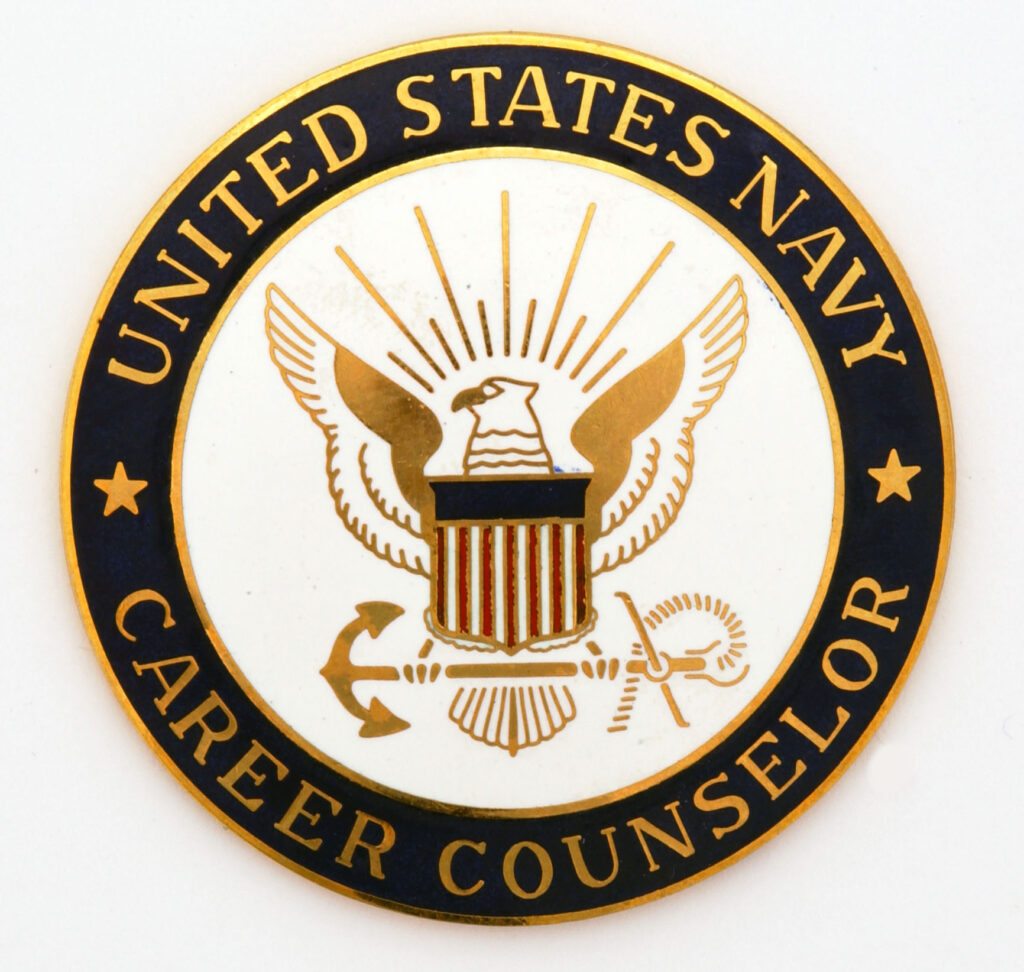
After a stop in Norfolk for Career Counselor School, I picked up my wife, and we drove to the west coast and shipped our VW Camper to HI. I reported to Midpack as I awaited the arrival of the Command from deployment and worked there for a month. When the Squadron arrived, I reported to the Commodore and began my tour. Since the Squadron had just returned from deployment and all of the ships needed maintenance, we became the shipyard squadron, taking seven ships thru the yards. As our ships began to complete their maintenance, we also began Dependents Cruises to the other islands. We would depart on Fridays, offload dependents, stay the weekends, and return to Pearl Harbor on Monday. My wife loved the chance to see all the islands this way. Finally, all our ships were ready for the main event, and we deployed again. Westpac was a fantastic way to go and had so many incredible ports. I had been promoted to ETC a few months before deployment, so berthing was a much better experience now. After we hit and left the Pi, it was time for the Indian Ocean.
After we entered the IO, we also crossed the line, and I became a Shellback. Many people dreaded the crossing, but after being initiated as a CPO, nothing was going to be too hard ever again; I was right. We hit many ports Sailors had not been to for years and had fun all over the IO. For me, the highlight was a photo Safari In Kenya. As we departed the IO, we had to pull past the coast of Nam, and of course, as we did, fishing boast spotted us. They were really boats full of refugees in 1979 as people were still escaping the ever-tightening grip of Communism, so as soon as they saw our ships, they scuttled their boats and began to sink. American warships had been instructed to render assistance if this happened, and each of our ships took on over 60 refugees. To accommodate all of these people, we had to use every available bunk, there were not many, and tie the helo to the deck so the hanger could be used as a place to sleep for the rest. As we outraced a Typhoon from the coast of Nam, we took the people to the PI and dropped them off. Upon arrival in HI, it was transfer time again.
Leaving HI and our friends behind was very difficult in October 1979, but we were on to Great Lakes (IN WINTER), where I was to be an Instructor in ET School. We arrived on November 10, 1979, my 13th Anniversary in the Navy, and DAMN it was COLD. Our VW Camper never recovered, and eventually, we had to replace it, but damn, it was cold after a tour in Paradise. Since I was supposed to be an Instructor, they sent me to Instructor School AGAIN. No previous school was recognized, so four weeks of boredom and graduating #1 (again). After that School, I went to see the Senior Instructor for an assignment. Since they had just implemented the Integrated Training Brigade (ITB) because of the riots at Great Lakes before I got there, he decided he needed me to be a Company Commander. Not just any Company Commander, but that of a FEMALE Company! I was not happy, my wife was not happy, and the lady I took over from was not happy to become my assistant CC. In the end, my tour as a CC worked well, and I became the Batallion Adjutant, in charge of all three Companies in the BEQ.

It was finally on to teaching in ET School. I qualified to teach in radar and took classes throughout the entire course from beginning to end, including the Practical Lab, where they were able to troubleshoot actual radar equipment; I was surprised one day to get the results of the Navy Selection Board for Senior Chief. It was my first look, and WHAM, I made it. As soon as the results came out, I was moved to Communications Branch Head. There I was in charge of all Communications Classes, an area twice the size of radar. Our senior instructor retired about a year later, and I took his place. Since I was getting close to transfer, I put in for the Senior Enlisted Academy, and I received orders to go to USS Nashville (LPD-13.
I went to Newport, RI, and was assigned to the Class 09/Green group at transfer. There we studied all aspects of Senior Leadership. Seven weeks of intense study in communication skills, leadership and management, national security affairs, Navy programs, and physical fitness. It felt a lot longer and yet not long enough. I learned a lot and was so happy to learn and teach our classmates from the other services.
USS Nashville was in Metro Machine when I reported to her in December 1983. Metro was the worst place I had ever seen for a ship’s crew to be berthed and live. The place was full of dust, and the air was barely breathable at times. No matter what we did, this was our fate in Metro; not a good experience, but eventually, we got our ship out of there. As we were ready to leave Metro, the Command Master Chief retired, and the CO asked me to take his place as the Command Senior Chief. I was not the most senior E-8 on the ship, so I talked it over with the others, and they all said they would support me. They did not want the job. We had a ship back about six months out of Metro, and it was working well. The Navy Wide Master Chief Promotion Board results were announced, and I was selected. Once again, it was my first look, and I was surprised. The new CO told me that I needed to either put in for the CNO Command Master Chief Program or revert to ET; he could not afford the loss of my billet any longer. I put in for it and was accepted. Top Gator and a couple of Battle “E” awards by the time I left!
I did a Shore tour as CMC after that at OPTEVFOR, and then it was back to Sea on a Precom ANZIO.

Anzio (CG-68) was my first and only Precomissioning ship. While I was still at OPTEVFOR, I went TAD to the shipyard for the Christening of ANZIO on November 10, 1990. (Amazing how that day keeps showing up.) We built the ship in MS at Ingalls Shipbuilding and took her to Norfolk for Commissioning at her Homeport. On May 2, 1992, Anzio became USS Anzio (CG-68). I am a plank holder. After Commissioning, we did a lot of work to make her a real ship, including deploying to the Caribbean, the Northern Coast of the US, and lots of work-ups. By the time I left in 1992, Anzio had won more than one Battle “E.”
My Twilight tour was at FASOTRAGRULANT, Norfolk Naval Air Station. After avoiding being really stationed with Airedales for 28 years, they got me on my last 2. Yes, Brown Shoes, Flight Jacket, and all! I loved learning all about the Aviation Community, going to my subordinate commands, and being part of the entire Command as we flew, drove, and walked around. I learned and taught a lot during Command Inspections and did not stop working until my relief was there, and I retired on September 30, 1996.
Looking back, not much I would have done differently. If I could, I would have advised my younger self to finish college before joining up.
If you participated in any military operations, including combat, humanitarian and peacekeeping operations, please describe those which made a lasting impact on you and, if life-changing, in what way?
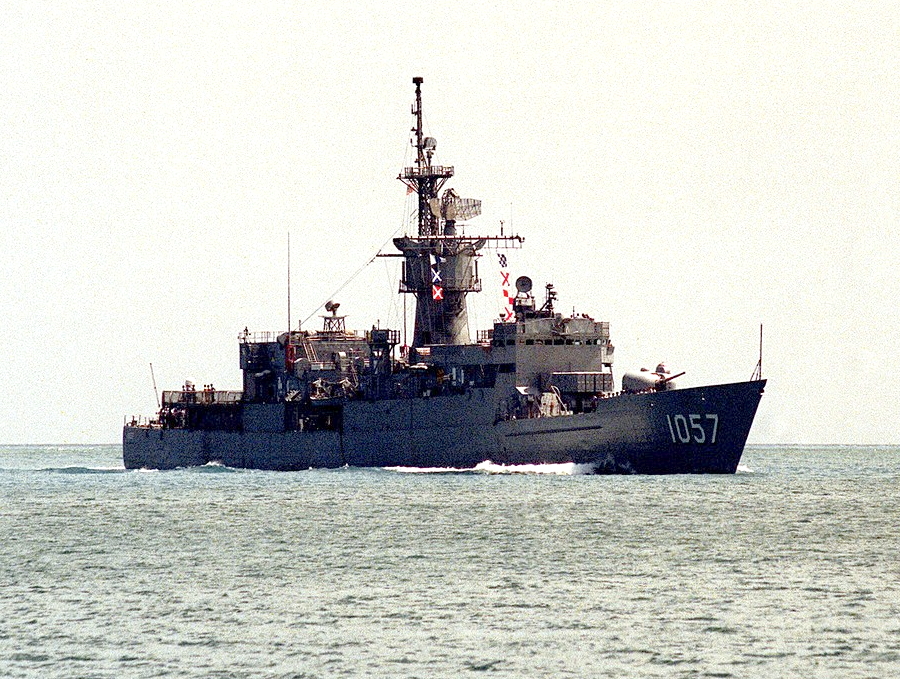
When I was with Commander Destroyer Squadron Thirty-Three, as we departed the IO, we came close to the coast of Vietnam. It was 1979, and many people were trying to escape from the Communist Regime there.
As we were near the coast of Nam, but still at least 50 miles away from the coast, fishing boats spotted us. They were boats full of refugees. As soon as they saw our ships, they scuttled their boats, sinking. American warships had been instructed to render assistance if this happened, and each of our ships took on over 60 refugees. To accommodate all of these people, we had to use every available bunk. There were not many, so we had to tie the helo to the deck so the hanger could be used as a place to sleep for the rest. As we outraced a Typhoon from the coast of Nam, we took the people to the PI and dropped them off.
The main thing I brought from this and remember to this day is the length people will go to escape from poverty and dictatorships to find a new life. America is a dream not all can reach, but many try to achieve.
Did you encounter any situation during your military service when you believed there was a possibility you might not survive? if so, please describe what happened and what was the outcome.
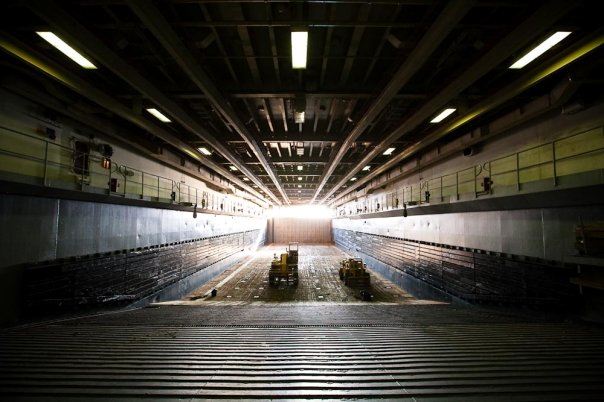
During my career, I rode out Hurricanes, Typhoons, and Cyclones. Honestly, I was never seasick and never in fear for my life on any of my ships. We trained like we would have fought, especially on my last two ships, which instilled a sense of well-being.
I was involved in two shipboard fires, and our training allowed us to manage these without real problems. The last one was on USS Nashville and was actually fairly bad. We had a fire in the after-line handling room while conducting helo and well deck operations while landing Marines on the beach. Because we had trained well, we were able to fight and control, then put out and recover from the fire without disrupting our landing exercise.
Of all your duty stations or assignments, which one do you have fondest memories of and why? Which was your least favorite?
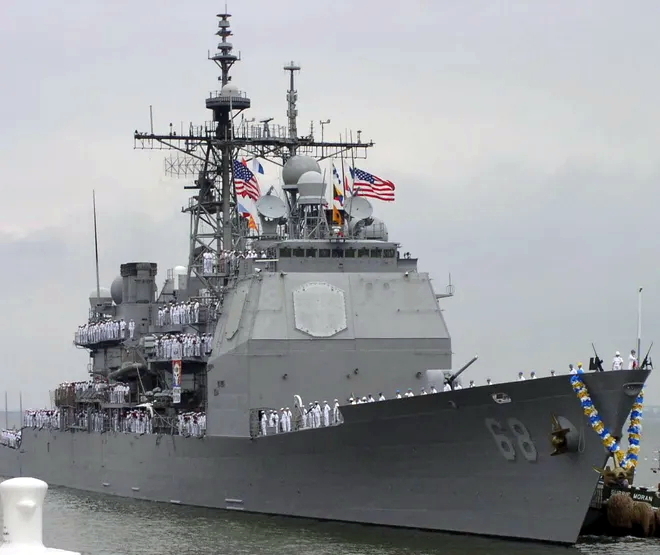
USS Anzio (CG-68) We built this ship. Team Anzio was a creation of all of the Planklowners, and I was her First Command Master Chief. I believe that I made a Major contribution to Anzio then and Anzio as she is today.
From your entire military service, describe any memories you still reflect back on to this day.
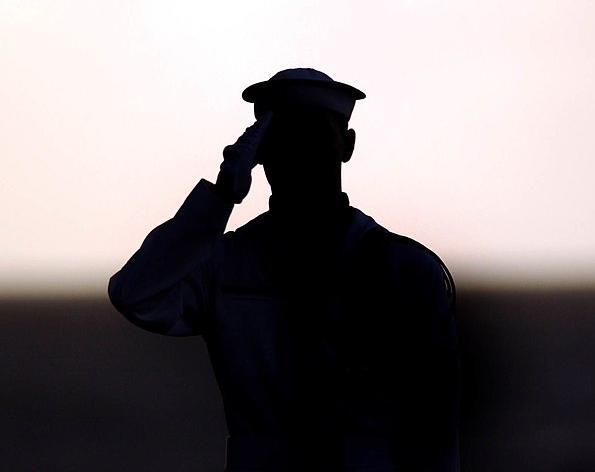
The loss of a Shipmate on liberty in Thailand. He was killed in a traffic accident and should never have been driving a motor scooter in a foreign country while drinking. Although not DWI, he was not totally under control either. I was not in his chain of command and not there when it happened, but I was deeply affected like all of the crew on a Knox Class FF.
What professional achievements are you most proud of from your military career?
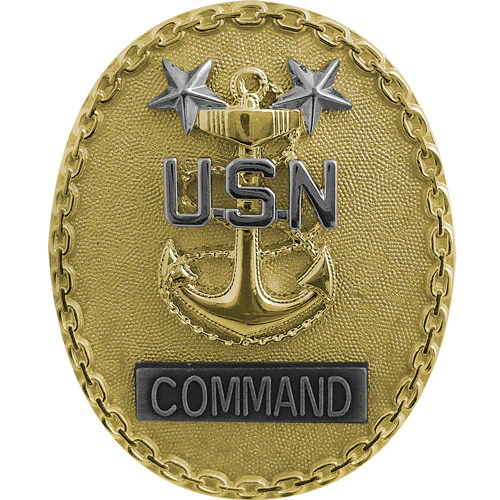
Without a doubt, my four tours as a CNO Designated Command Master Chief. I was able to handle my assignments on all of my duty stations professionally and impact the Sailors, Marines, and others I positively came into contact with in a good manner.
I believe I set the standards and was able to train my reliefs in the Navy, and more than one Master Chief went into the Program due to my influence. The Commanding Officers I worked for and with were able to trust me to do the job of caring for our troops and have a smooth running ship or station.
Of all the medals, awards, formal presentations and qualification badges you received, or other memorabilia, which one is the most meaningful to you and why?
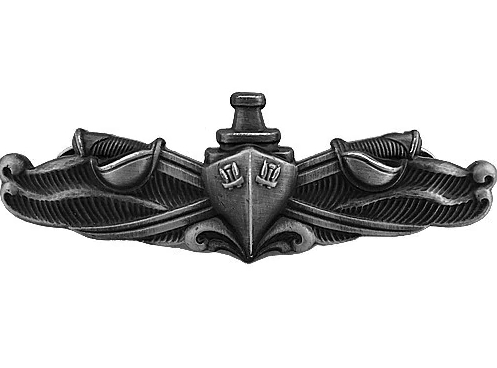
ESWS – I earned my Enlisted Surface Warfare Qualification while attached to the Staff of Destroyer Squadron Thirty-Three. My Qualification Board consisted of the Commodore and four of the Squadron Commanding Officers. This was more of a Command Qualification than an ESWS Qual, and our Senior Enlisted Advisor (We did not have CMCs at the time) was not a member and was not allowed in the room. After this board, I was very proud of my qualification. Subsequent boards that I chaired were a different type – sometimes tougher, but more fairly.
Which individual(s) from your time in the military stand out as having the most positive impact on you and why?
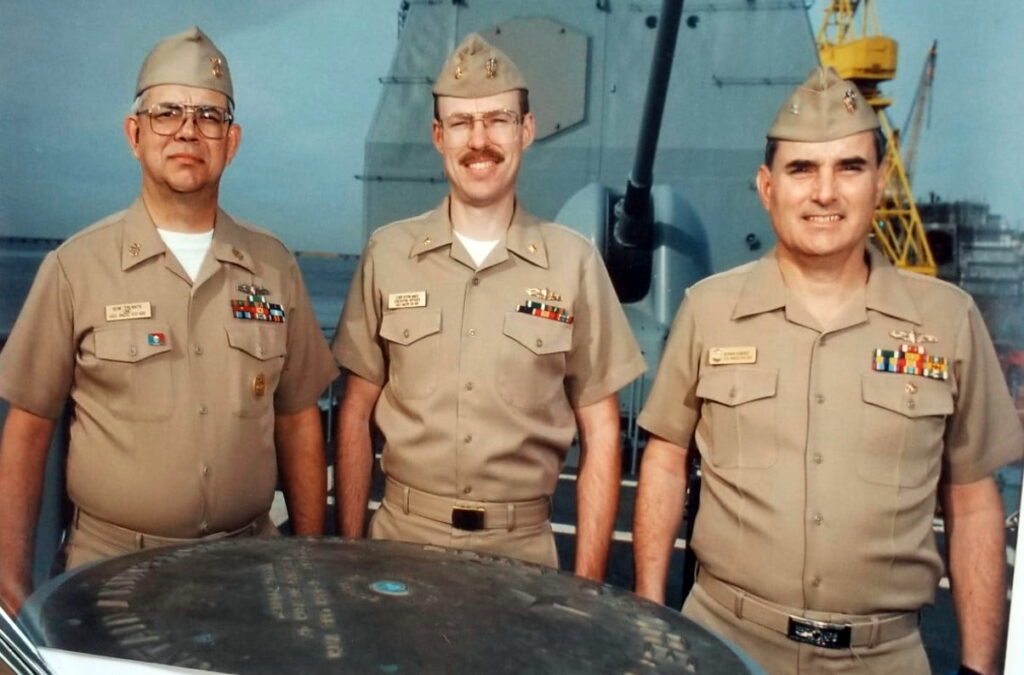
Jerry Felton. He was my first underway LPO. he instilled a good sense of technical proficiency and military leadership. I turned 21 while underway on my very first Caribbean Cruise, and he made sure that the celebration was both appropriate and timely. This gave me a good understanding of the importance of both rules and morale. Being in the Bermuda Triangle on your birthday does not have to be a bummer if your LPO is a decent human being.
The Command Triad was the strongest I ever worked with on my last ship. We were together from Pre-Com through Commissioning and a few years later. That bond was strong, and we knew we could depend on each other.
Can you recount a particular incident from your service, which may or may not have been funny at the time, but still makes you laugh?
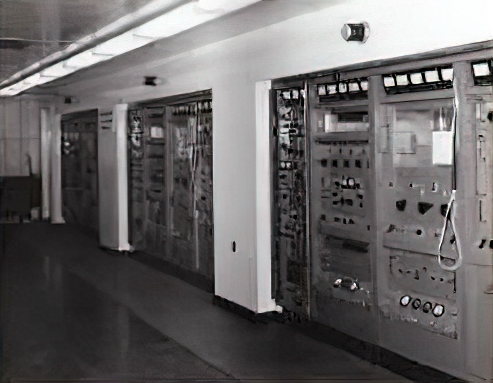
Guam’s 1970 New Year’s Eve party at the Barrigada Radio Transmitter Site club was going strong when we lost power. All Transmitters were down, and Emergency Backup Power DID NOT come back up for over 15 minutes. ALL ETs and RMs left the party (taking their libations along) and proceeded to the two transmitter buildings. Power came back up, and we repurchased all transmitters up within 45 min. I returned to the club in time to ring in the New Year!
What profession did you follow after your military service and what are you doing now? If you are currently serving, what is your present occupational specialty?
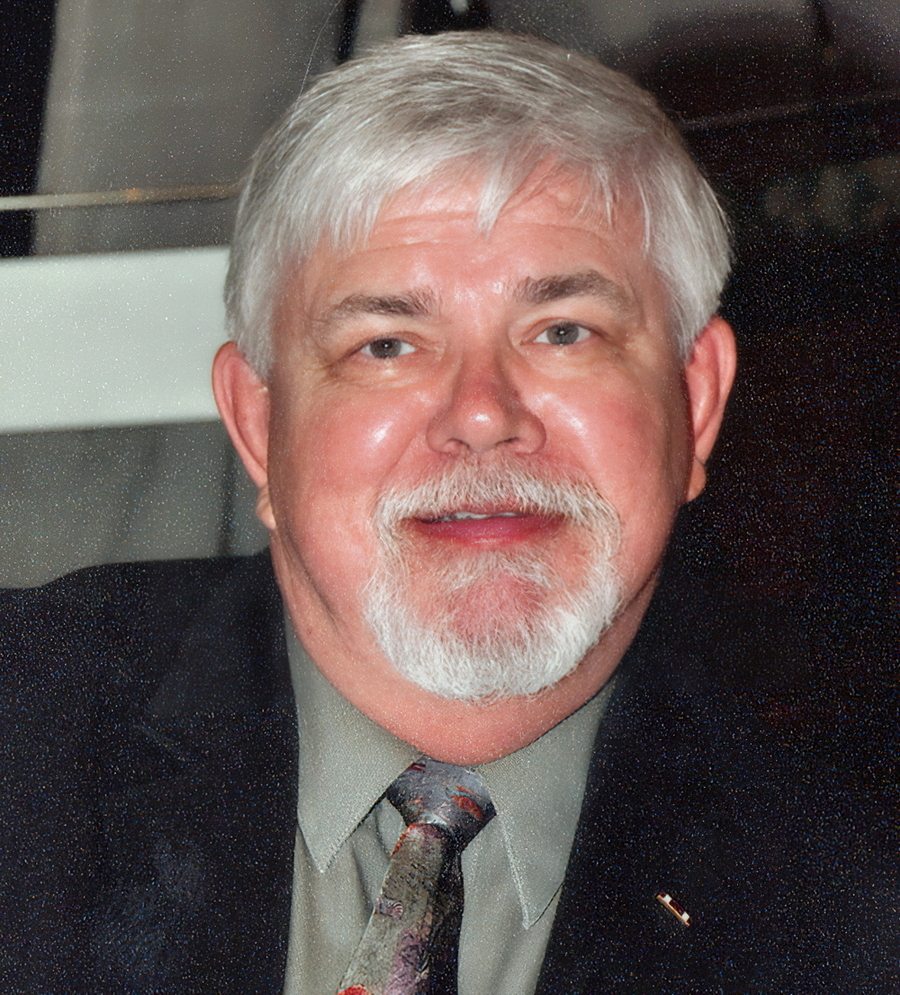
After USN went to work for Wally World, that experience convinced me to go back to school and finish my degree. I then went to work for Child Protective Services, Randolph County, NC. Combat is safer and less stressful; you know who the enemy is and can carry a gun. Parents should be tested and licensed before being allowed to be in the same state as their children.
I am currently retired and triple-dipping!
What military associations are you a member of, if any? What specific benefits do you derive from your memberships?
In what ways has serving in the military influenced the way you have approached your life and your career? what do you miss most about your time in the service?
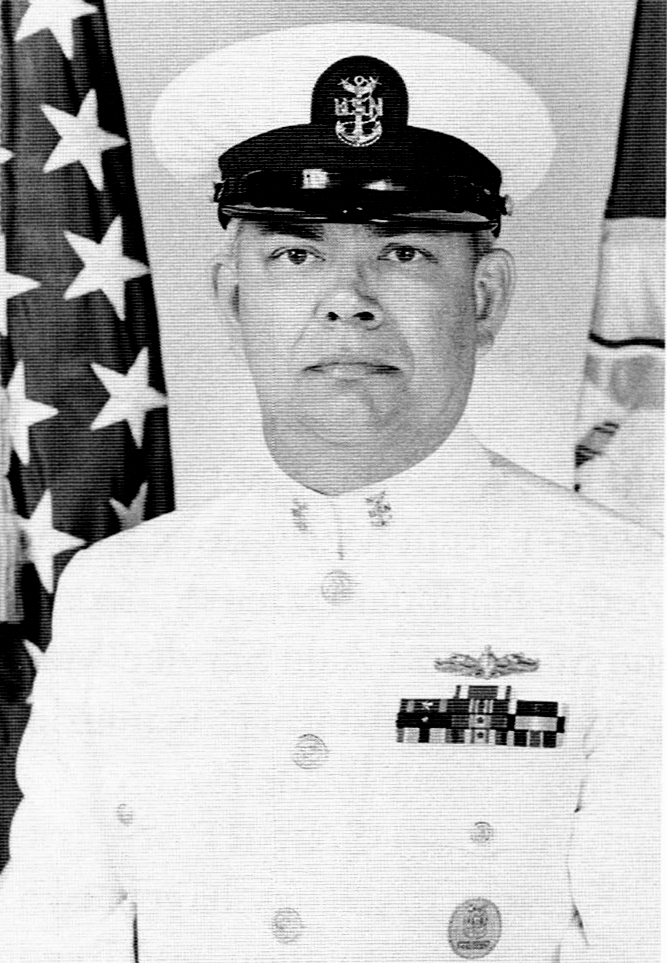
Yes – I tend to be very patriotic and do not believe that our civilian leadership is currently on the path of protecting our Constitution or our way of life. I think that ALL elected officials should be required to serve in the Armed Forces for at least one tour of duty.
I also strongly believe that male and female citizens should do at least two years of service to the country. Military, Peace Corps, or other service organizations on the Federal level should be a requirement before holding any public office.
Based on your own experiences, what advice would you give to those who have recently joined the Navy?
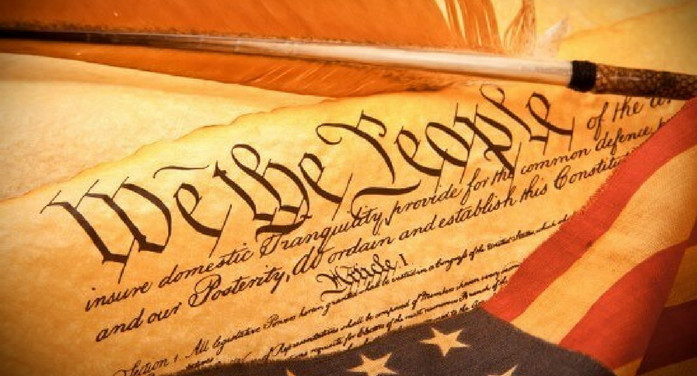
VOTE. That is the only way to have a voice that your civilian leadership will listen to and understand. If you do not vote, you do not have any say.
Listen to your leaders and obey orders. Learn the Sailors Creed and UNDERSTAND what it means. READ the Constitution and study it – you swore to protect it. (I will support and defend the Constitution of the United States against all enemies, foreign and domestic; that I will bear true faith and allegiance to the same; and that I will obey the orders of the President of the United States and the orders of the officers appointed, remember?)
In what ways has togetherweserved.com helped you remember your military service and the friends you served with.
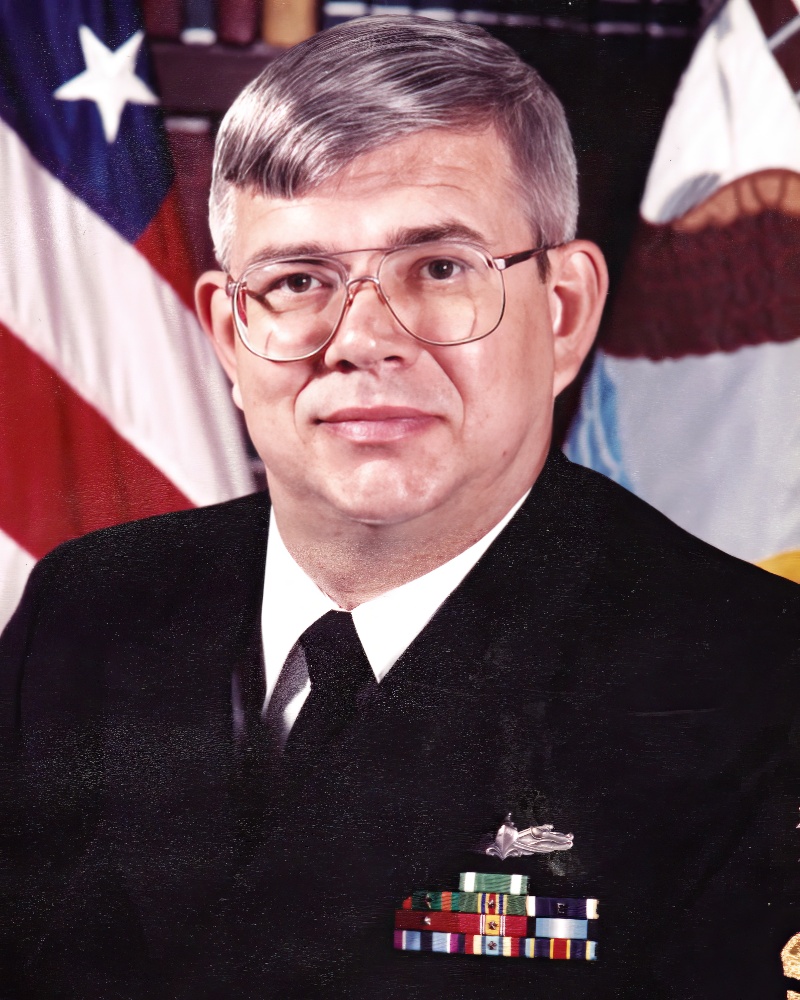
ETCM Gene Treants Military Service Plaque
PRESERVE YOUR OWN SERVICE MEMORIES!
Boot Camp, Units, Combat Operations
Join Togetherweserved.com to Create a Legacy of Your Service
U.S. Marine Corps, U.S. Navy, U.S. Air Force, U.S.z Army, U.S. Coast Guard
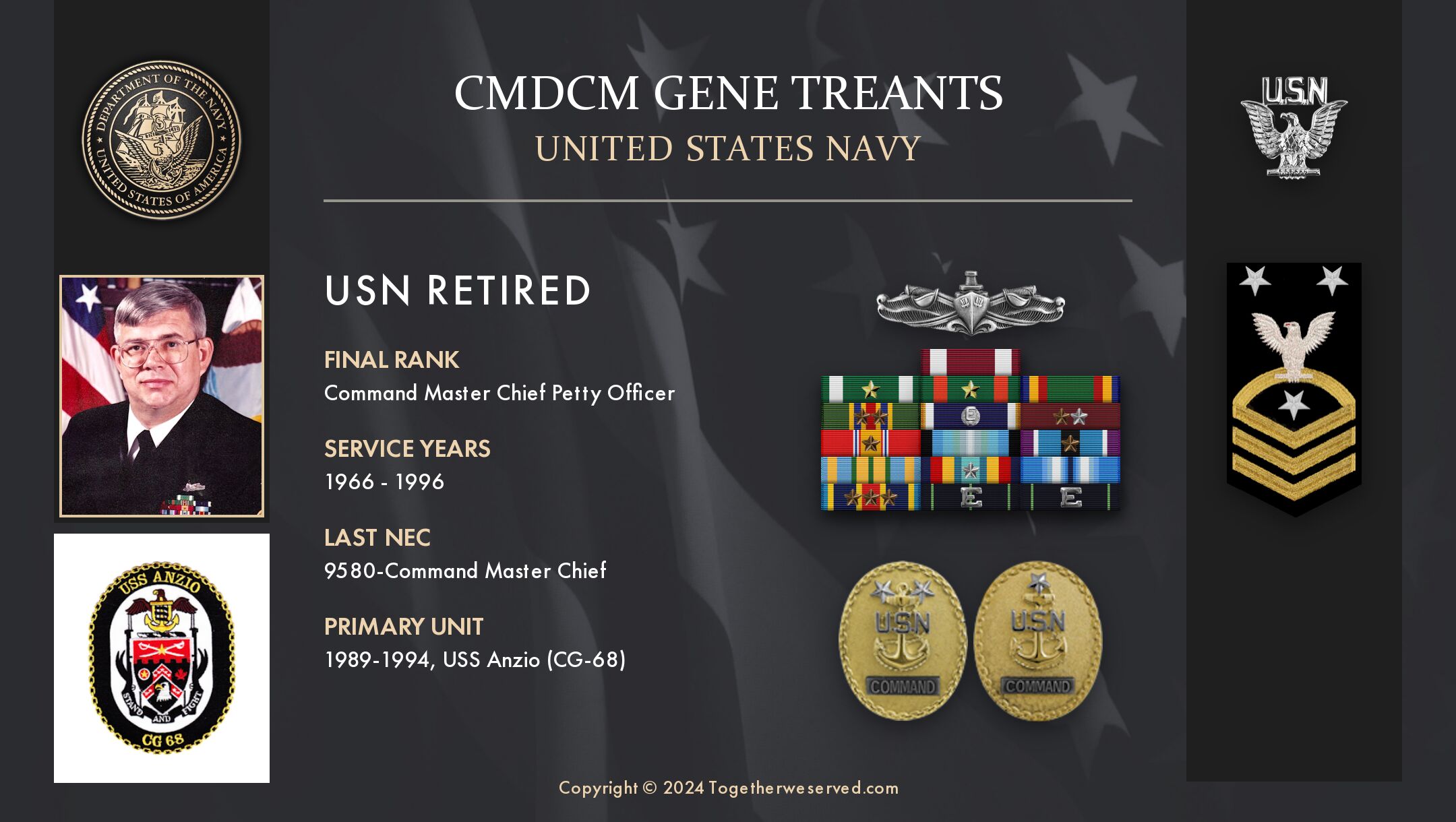
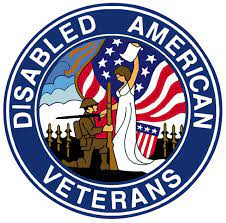
0 Comments